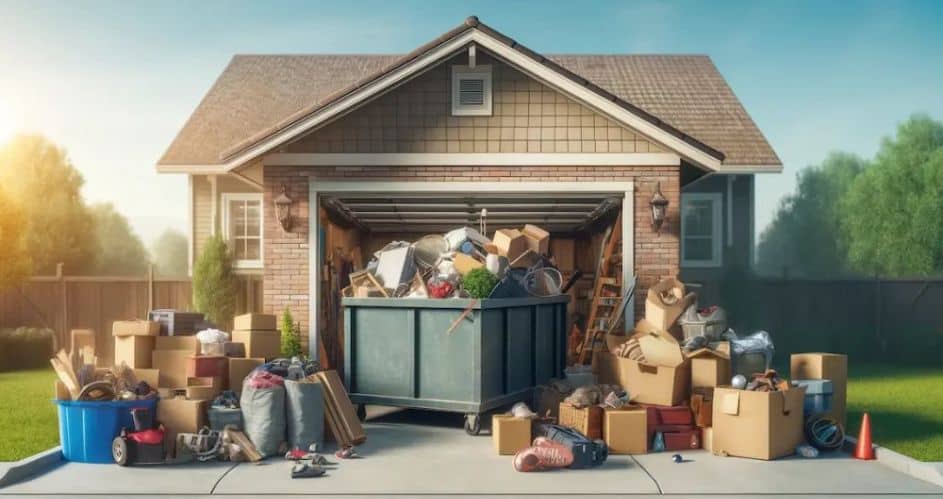
So last spring, my brother and I decided to finally tear down that rotting shed in the backyard. Thought it’d be a weekend job—easy, maybe a little dusty.
But by Sunday afternoon, we were ankle-deep in splintered wood, rusted tools, busted plastic chairs, and a whole heap of “what the hell is this even from?” stuff. Long story short: we needed a dumpster. Fast.
Renting a dumpster seems pretty straightforward until you’re actually staring at five different container sizes, a dozen pricing options, and weird rules about what you can and can’t chuck in.
Trust me, I’ve been there. If you’re doing a renovation, cleaning out a garage, or just decluttering after years of hoarding “useful” junk like old floor tiles and broken folding chairs… yeah, a dumpster makes life easier. But there are a few things I wish I’d known the first time around.
Get Advice From your Rental Company
thought, “Let’s go big. Better safe than sorry.” That logic ended up costing us extra because we barely filled half of it. And it looked kind of ridiculous sitting in the driveway for a week like we were demolishing a whole house.
Lesson learned: ask your rental company for advice. Elginsdumpstersbocaraton.com is giving you some tips to make an educated decision.
Estimate your Costs Accurately
Not every rental company charges the same rates, and sometimes hidden costs are buried in the fine print. That’s why it’s a good idea to request quotes from multiple providers and check details such as delivery and pickup fees, how long you can keep the container, any additional charges for exceeding weight limits, and what can and cannot be disposed of. Comparing these factors can lead to significant savings.
Consider in advance how long you actually need the dumpster. Many companies offer a standard rental period, such as a week. If you need it for a shorter time, ask if a cheaper option is available. If you need it longer, inquire about the extension fees so you don’t get hit with unexpected costs.
Loading your dumpster efficiently can save you a lot of space (and money). Break down large waste items, such as furniture or planks, into smaller pieces, stack materials neatly to avoid empty spaces, and place heavy materials at the bottom and lighter ones on top. By stacking strategically, you make the most of the available space.
Save the Environment and Your Wallet
Not everything can simply be thrown into a dumpster. Materials like asbestos, batteries, chemical waste, and electronics must be disposed of separately. If you put something in the container that isn’t allowed, you may receive a fine or have to pay extra for disposal. Not sure? Always check with the rental company.
I tried to sneak an old printer in once. Bad idea. Electronics, chemicals, batteries—those aren’t supposed to go in with general waste. And yeah, they do check. If you’re not sure, ask. Some companies offer separate bins for recyclables, and honestly, it’s not just about avoiding a fine.
It feels better knowing the busted ceiling fan or box of dead batteries might not end up in a landfill.
Most dumpsters have a maximum weight capacity. If you plan to dispose of heavy materials like concrete, bricks, or tiles, you could quickly exceed the limit and face extra fees. Check in advance what the weight restrictions are and whether there are special dumpsters available for heavy waste.
Think about a good Dumpster Setup
Where you place the dumpster can make a big difference in convenience. Ideally, set it up as close as possible to where you’ll be collecting the waste so you don’t have to carry everything too far. Also, keep in mind that if you place the container on public property, some municipalities may require a permit.
The less waste you generate, the smaller (and cheaper) the dumpster you’ll need. Consider whether certain items can be reused, sold, or donated through a local second-hand shop. Less waste means lower costs and a more sustainable approach.
Some rental companies offer discounts if you rent multiple dumpsters at once or if you separate your waste properly. It may also be cheaper to rent outside peak seasons, as prices are often lower then. Asking about possible discounts can lead to a nice saving.
Ready to get started?
Renting a dumpster doesn’t have to be complicated if you approach it wisely. By carefully choosing the right size, comparing prices, loading efficiently, and keeping recycling in mind, you can save money and ensure proper waste disposal. So, are you ready to get started?
